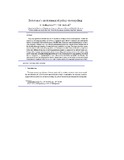| dc.contributor.author | Ketlogetswe, C. | |
| dc.contributor.author | Mothudi, T.H. | |
| dc.date.accessioned | 2009-10-05T12:47:17Z | |
| dc.date.available | 2009-10-05T12:47:17Z | |
| dc.date.issued | 2005 | |
| dc.identifier.citation | Ketlogetswe, C. & Mothudi, T.H. (2005) Botswana’s environmental policy on recycling, Resources, Conservation and Recycling, Vol. 44, pp. 333–342 | en_US |
| dc.identifier.issn | 0921-3449 | |
| dc.identifier.uri | http://hdl.handle.net/10311/378 | |
| dc.description.abstract | Recycling operations have become one of the primary strategies forwaste management,worldwide.
Especially, recycling operations are viewed as among the most effective techniques for reducing the
amount of municipal solid waste disposed at landfill sites. Botswana’s environmental policy on recycling
stipulates, among others, that all waste management authorities should provide information on
the classification and quantities of controlledwaste targeted for recycling. This paper, therefore, examines
the extent to which recycling operations in Botswana have either been conducted in compliance
with or in violation of some major environmental requirements as enunciated on statutory guidelines.
Compatibility between environmental policies on recycling and actual practice is evaluated focusing
on two companies (Dumatau trading and Botswana Tissue) involved in recycling operation. Data from
the two companies is complemented by one collected from the Gaborone landfill site. Finally, this
study discusses on the role played by various stakeholders in policy formulation and implementation
with particular emphasis being placed on a select number of non-governmental organisations (NGO). | en_US |
| dc.language.iso | en | en_US |
| dc.publisher | www.elsevier.com/locate/resconrec | en_US |
| dc.subject | Recycling | en_US |
| dc.subject | Policy | en_US |
| dc.subject | Botswana | en_US |
| dc.title | Botswana’s environmental policy on recycling | en_US |
| dc.type | Published Article | en_US |

